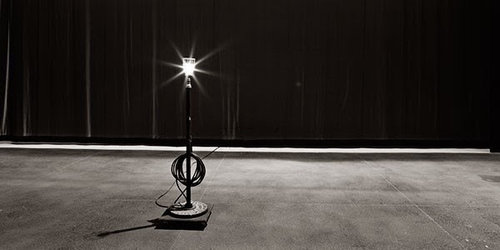Feeling Superstitious: Ghost Lights and Whistling Backstage
The origins of theatrical superstitions can be surprising; they can be reflective of a larger awareness of the supernatural, but they can also speak to the conventions of a bygone way of doing things in the theatre. Last week, we looked at why you should never speak the name of Shakespeare’s Scottish play and the misfortunes that lead to the formation of the curse. This week, we look at two different traditions in the theatre that, while they have their superstitious meanings, they also have an element of practicality behind them.
Ghost Lights
A ghost light—sometimes just a bare lightbulb on a stand—sits unobtrusively on the stage when the theatre is empty. Ghost lights are often very simple, but their meanings run deep. During the COVID-19 pandemic theatre closures, the ghost light became a symbol of hope to artists during a time of darkness. Although no one was in the theatre for quite some time, the light remained on for their eventual return.
The practical reason for the ghost light is evident. If someone were to enter a completely dark theatre, it might be a safety concern. Hazards in an unlit house include the edge of the stage, bumps and holes in the stage itself, working equipment for set pieces, and the set itself. Legend has it that the genesis of the ghost light came from an unlucky burglar that fell into the orchestra pit when the house was dark and empty. The story ends with the burglar attempting to sue the theatre. The ghost light was added as a precaution so no one could trip like that again—whether they were there legally or illegally.
While ghost lights are very practical and utilized in theatres around the world, they also have a spiritual meaning. The lights are said to ward away mischievous spirits. However, the light also serves as a guide for the ghosts that are believed to haunt every theatre. These theatre ghosts are not seen as malicious, but rather they are ghosts that can be kept happy by having their home lit.
Whistling
Much like directly wishing actors “good luck” before they go onstage, the act of whistling backstage is considered to bring on misfortune to a production. Like the ghost light, there was a practical reason for why it became a theatre superstition. Unlike the legend that explained the ghost light, however, there is true historical basis for this superstition.
The roots of “no whistling backstage” began in the 17th century. During this time, stage managers (known then as prompters) oversaw a variety of theatrical duties including overseeing rehearsals and prompting, as their title implies, entrances, music, special effects, and set pieces. Well before the advent of electricity, prompters used whistles and bells to signal to stagehands what was needed during the scene. Whistling during the performance was not distracting for the audience–it was an understood convention of the time and promptbooks from the era often include “W” for whistle.
One reason whistling was also employed at the theatre was that many overhire stagehands were also dockworkers. The theatrical season often coincided with the winter months and stage mechanics of the period included a system of ropes, knots, and pulleys so these workers were not only available but also well-equipped for the task. Whistling was part of the nautical tradition, and it carried over to the theatre. However, it was important that no one else whistle, because an innocent actor whistling backstage could cause a cue to happen at the wrong time leading to unexpected consequences.
Although theatrical professionals no longer depend on hearing whistles to know when to move set pieces, the ban on whistling has remained lest bad luck be tempted.


